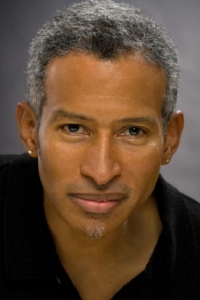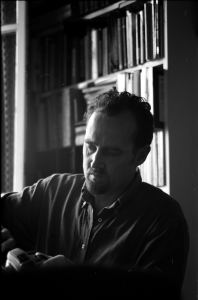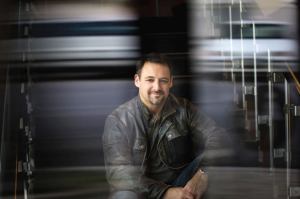Interview with Leonce Gaiter (author of In the Company of Educated Men)
 Leonce Gaiter has recently published his novel In the Company of Educated Men. We’re asking him some questions about the book, and not only. Here’s what he has told us…
Leonce Gaiter has recently published his novel In the Company of Educated Men. We’re asking him some questions about the book, and not only. Here’s what he has told us…
[Q]: Who is Leonce Gaiter as a person and as a writer?
[A]: Because I’m a writer, anything I tell you about myself as a person would probably be a lie, so I won’t go there. As you are doubtless aware, writers are full of it. Frankly, I don’t know how much of my past I’ve truly remembered versus embellished and concocted out of fragments and shards. I have no idea how I came to be, but I’m here, and as a writer, the world can choose to deal with some aspects of various versions of me through my books. Otherwise, they are totally spared, which is their good fortune!
[Q]: Where did you get the idea for In the Company of Educated Men?
[A]: The book grew from a screenplay I had written more than 20 years ago, and that screenplay grew out of the somewhat sheltered existence I’d known throughout high school and college. Attending a good high school in a Washington, D.C. suburb, I had fallen in with a like-minded crowd of artsy types who rarely even turned on a television and only heard top 40 radio by accident. We were quite the snobby elitists, despite that fact that we really didn’t have the money to pull it off.
From high school I went to Harvard, where a lot of people did have the money to pull it off. I had spent all of my school years as a black student in overwhelmingly white worlds, so I was no stranger to societal divisions, and leaving school and confronting the real world was quite a shock. My mildly sheltered existence had not prepared me for the fact of how radically different the life I’d known was from that of most Americans.
The screenplay sprang from wanting to explore someone deeply sheltered, and having to confront the America most of us live in—and vice versa.It gave me a chance to explore class divisions, geographical divisions and racial division, all of which are central to this country.
[Q]: Can you briefly summarize it (without telling us too much, of course)?
[A]: It’s a memory piece in which the protagonist tries to make sense of the critical events that shaped his life. As a recent Harvard graduate of means, he faces a grave personal loss that forces him to question… everything. So he contrives a road trip, dragging his two best school friends with him, to find the answer to his questions somewhere on the road.
The recent graduate trio happen upon a desperate kid with a gun, and a little girl trying to flee a domestic hell. All lost, all searching, they find each other for only a moment, before cruel realities overwhelm them, threaten, and finally nearly defeat them.
[Q]: Why readers might like it? Is there anything they might find difficult to accept in the book?
[A]: We often to pay homage to books that “challenge our assumptions,” but by and large I fear it’s self-aggrandizement. Most of the books we know and love reinforce our status quo, our visions of ourselves, and of our places in the world. I have written books in the past that I believe have had elements readers found difficult to accept, but I don’t think this is one of them—in fact, it was designed not to be.
I hope that it entertains because paints a vivid picture of a world as seen through a unique set of eyes. I am not a realist; I’m not trying to recreate the world as we all know it. I’m trying to create a world that grows from the characters and their situations—a world with recognizable aspects of this one, but a world that’s plainly extraordinary.
[Q]: Is Lennie Ashland character based on someone you know?
[A]: I think everyone in the book is a gross perversion of one or many people I’ve known. Ditto for every character I’ve ever written. Sometimes I think every character in this and all my other books are based on me.
[Q]: Are you already working on a new book?
[A]: I have completed another. Now all I have to do is try to sell the thing, which in my experience has been just as much work as writing it.
[Q]: What’s your opinion regarding ebooks and traditional books?
[A]: Both work. Hardback, paperback, ebook… it doesn’t matter. Whatever floats your boat. I have issues with pricing on ebooks, and with the bulk of the business model for print books (especially hardbacks, which I think are a little absurd), but how you read is insignificant.
[Q]: A suggestion to wannabe writers. A suggestion to passionate readers.
[A]: I wouldn’t dare try to give advice to writers. In 21st century America, fiction is not highly valued, and in a corporate publishing world, good writing and good reading (to my tastes at least) are both distressingly rare.
To passionate readers I simply say, read on, and buy ‘In the Company of Educated Men’ as a holiday gift for everyone you know!
[Q]: Thanks for having been with us, Leon.
[A]: Thank you.






